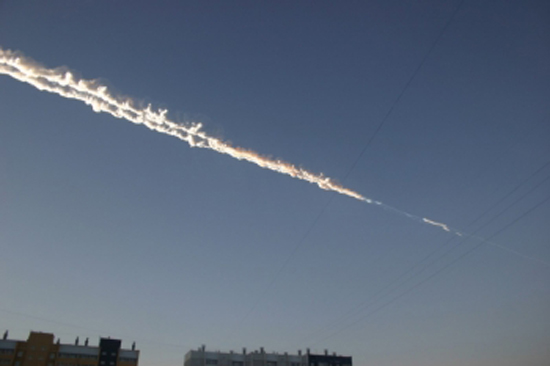Meteorite Falls in Eastern Russia, Causes Damage: Reports

A meteor streaked across the sky in eastern Russia Friday (Feb. 15), unleashing a powerful blast that shattered windows, damaged buildings and may have caused injuries, according to Russian officials and news reports.
The surprising celestial sight occurred in the Russian region of the Ural Mountains and is initially being attributed to a meteor explosion in the atmosphere by authorities, according to a Reuters report. Up to 100 injuries have been reported, as well as the discovery of a meteorite from the event, according to the Associated Press.
Translations of updates on the Russian Emergency Ministry website suggest that some damage to buildings was caused by the meteor blast, and that meteorite fragments from the event were expected to be recovered.
Broken windows were found at at least 10 schools and three health facilities in the Chelyabinsk region, ministry officials wrote in an update. The shock wave from the meteor explosion also partially collapsed the warehouse of a zinc plant, they added.
Reuters cited a report by the Russian news agency RIA-Novosti, which stated that officials had detected a mid-air blast at an altitude of about 32,800 feet (10,000 meters). It was reportedly widely seen across Russia's eastern Chelyabinsk and Sverdovsk regions, Reuters reported.
A report by the Russian television news agency Russia Today showed video of the possible meteor, which included what appears to be a fireball streaking across the sky from several vantage points. At times the object is so bright it casts shadows.
In 1908, a fireball exploded over the Tunguska River in Siberia, Russia, flattening hundreds of square miles of land during a massive blast. That fireball was created by the explosion of an object about 150 feet (45 meters) across, NASA scientists have said.
Sign up for the Live Science daily newsletter now
Get the world’s most fascinating discoveries delivered straight to your inbox.
A similarly sized object, the asteroid 2012 DA14, will fly extremely close to Earth on Friday, but will not hit the planet. The asteroid will approach within 17,200 miles (27,000 kilometers) of the Earth —about 5,000 miles (8,046 km) closer than geosynchronous satellites —during the close shave.
According to Russia Today, there has been some speculation that the apparent meteor explosion could be somehow related to the upcoming flyby of asteroid 2012 DA14.
However, NASA astronomer Don Yeomans, who leads the space agency's Near-Earth Object Program Office, has repeatedly said that asteroid 2012 DA14 poses no threat to the Earth no, or in the foreseeable future.
Asteroid 2012 DA14 was discovered in February 2012 and is being closely tracked by NASA and astronomers around the world. The asteroid is about half the size of a football field, but will not be visible to the naked eye when it flies by on Friday. A small telescope or binoculars, very dark skies and good timing will be needed to see the fast-moving asteroid.
SPACE.com will provide updates on the apparent Russia meteor event as details unfold.
This story was updated at 3:01 a.m. ET. Follow SPACE.com on Twitter @Spacedotcom. We're also on Facebook & Google+.

Tariq is the editor-in-chief of Live Science's sister site Space.com. He joined the team in 2001 as a staff writer, and later editor, focusing on human spaceflight, exploration and space science. Before joining Space.com, Tariq was a staff reporter for The Los Angeles Times, covering education and city beats in La Habra, Fullerton and Huntington Beach. He is also an Eagle Scout (yes, he has the Space Exploration merit badge) and went to Space Camp four times. He has journalism degrees from the University of Southern California and New York University.











